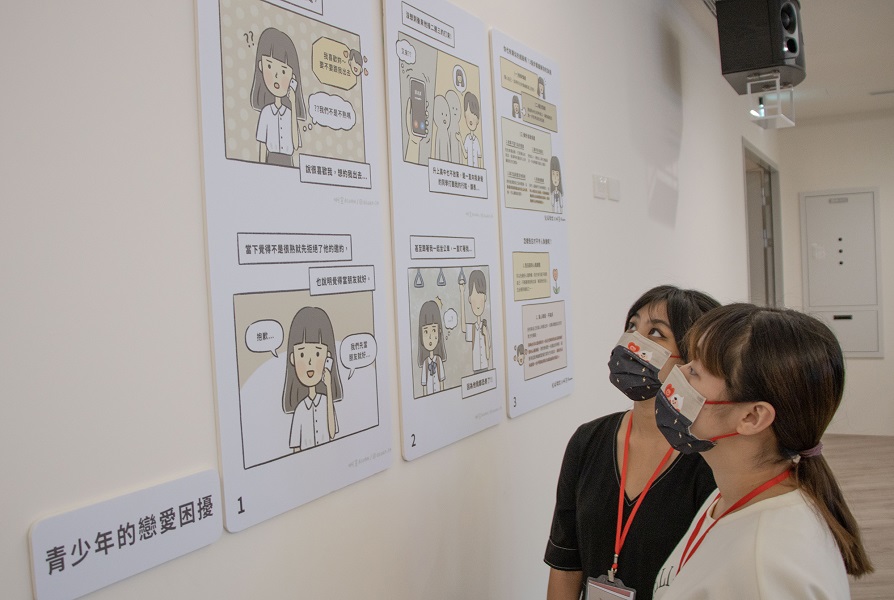
Press Conference on Children Relationships and Emotional Education
Want to Find My Love! Are Parents Ready for Children’s Emotional Education?
It is never a new thing, to see youngsters holding each other’s hand, hugging or kissing out in public. However, have you ever thought of any problems behind it? The Child Welfare League Foundation (CWLF) conducted a survey across 1,405 schoolers aged 11 to 15 on the “2022 Children’s Relationships Recognitions and Emotional Education Survey.” The results show a nearly 40% of secondary school children wanted to have a romantic relationship now, and over one-fifth (22.6%) of primary schoolers are eager to try it. In this digital era with multi-channels for one to make acquaintances, children can now get the taste of love via various methods, ages of children who started being curious about love gradually dropped, and the percentage of those who started a relationship has grown by almost 10% over the past eight years (8.4 of primary schoolers and 9.7% of secondary schoolers).
The survey asking about their actual experience of dating found that 32.9% of children had such experience. Compared with the 26.6% result received in 2014, the statistic obviously increased. Regarding the time count of children in love, 43.1% had once, 24.6% twice, however, over thirty percent (32.1%) of children had more than thrice of experience in a romantic relationship. A more detailed questionnaire asked about the duration of each relationship, 38.7% of children’s relationships lasted less than three months, 59.1% had less than half a year of it, and only 22.8% of children had a relationship of more than a year long.
Love life has always been children’s most desirable practice at the time, however at the same time all parents’ most worrisome issue. From this report of CWLF we shall see three phenomena worth concerning.Over half of children do not discuss emotional topics with their parents and 17% of them presumed love means willing to do anything.
For what reason do children want to get in love? The peers and media play a key role. According to the study, children’s knowledge of relationships mainly came from friends and classmates (50.2%), YouTube (36.7%), novels and manga (31.6%), films (29.9%), google search (29.5%), and TikTok (25.2%), all aspects are above a quarter percentage.
While innocent children exploring the world of emotional relationships, parents and teachers seemed to be absent. If we asked children about their parents’ viewpoints toward them pursuing a relationship, 10.2% of children assumed that their parents are against it; over half (51.6%) of whom not sure about their parents’ attitude. The statistic shows the lack of dialogue between children and parents regarding emotional education issues. On the school side, the case when teachers knew about them in a relationship, 25.1% assumed their teacher telling parents; 22.1% thought the teacher would disagree with it; 16% even felt that the teacher would strongly against and give verbal warnings. All the reasons above telling if one starts a relationship would be considered a problem student, making children rather have a relationship under the table.
Lack of the accompany of adults in the gradual emotional education could affect the love values of children. In the light of the survey, 17% of children responded that “In a relationship, they are willing to do anything in order to please their partner.”; 11.3% claimed that “If I liked the person, I don't mind being the third person in a relationship.” The concerning responses showed that over 10% of children take relationships beyond anything else. Had we compared the result with the one from 2014 (15.5% and 7.3%), both numbers increased distinctively. Furthermore, the physical boundaries between children in love had also lowered. There are 44.5% of children considered it allowable to hold hands, 19.7% thought it acceptable to kiss, and 4.5% of children believed that having sex is acceptable as long as love exists. Surprisingly, blind love allured them to unguard themselves, not aware that it could already violate the law.Not dating face-to-face anymore nowadays, an online husband/wife is the new style.
75.9% of children go for internet relationships and 52.7% of children would chat with strangers online.
As people nowadays are inseparable from the internet, especially the younger generations, more and more children tend to make friends online, some may even dive into an internet relationship. The survey reveals that over 52.7% of children talk to strangers online; 75.9% of children are pro internet relationships. Above that, 20% of children responded that they had the experience of dating an internet friend, which is the second highest source of where children meet their dates. Compared with the statistic from 2014, percentages have increased from 16.4% to 22%, an over 5 percent of growth.
If you asked children about how they would define an internet relationship, 61.8% of children considered having feelings for each other counts, 43.1% of children said it takes only talking along well with the person to count as you are being in a relationship, and 20.9% consider calling each other husband/wife online proves their relationship status. These statistics have shown that children are not cautious enough of the risks behind these scenarios, that you did not make sure the actual identity of the person and real-life interactions are not needed, two people with a consensus that they are dating, that is enough.
Something especially concerning is that online dating tends to end up ugly more possibly, compared to live relationships; and online dating leads to a thinner boundary to physical distance, making it easy to develop into sexual encounters. Needless to say, in the internet world, things could be way more complex because of the age, background and identity of the person on the opposite of the screen, and children under a pink bubble could put themselves under more safety risks.

Being left on read is heartbreaking, and I have no one to share my despair with.
65.6% of children had negative experiences in past relationships, 10% of whom even thought about self-harming.
Besides the sweet parts in love, there are the bitter parts, some might even meet a terror lover. CWLF survey tells that over two-thirds (65.6%) of children had encountered negativity in relationship experience, the most common situation taking 53.2% is being left on read or their partner went ghosting; other than that, 49.5% responded that they worried about the awkwardness of seeing each other after breaking up. Concerning enough, a part of children (6.6%) was asked of intimate interactions by their dates, 3% were threatened by their dates that they would commit suicide or hurt themselves if the children does not comply, and some (1.7%) were even asked to send private (including nude) photographs/videos of themselves.
From the report of the research, seemed that the urge to fall in love is a secret that could not be revealed to one’s parents. Of all children with the experience of romantic relationships, only 23.6% would share the situation with their parents, they would not seek help from their parents or teachers even when they have encountered some sort of problem or danger, but rather confide to peers (54.2%), or just cry it off (35.5%). What is more disturbing is that over 10% (12.1%) of children did not want to attend school classes due to the emotional turbulence and 8.6% of children even thought about hurting themselves.
How to discern love and like? How about going through a relationship with your child?
Accept that children are craving a relationship, and plan for emotional education starting from primary schoolers.
Huang Yun-Hsuan, director of the branch of organisational operation in CWLF stated several common problems for children, for instance, that they do not tell whether they really like the other person; got left on read or ignored; fall for the same person with their besties, or the embarrassments after the breakup. These topics not brought up in textbooks seemed like taboos between parents and children, but they are materials of emotional education that children need most desperately. If we were to ask children what they would expect to learn, over half of the children (61.4%) responded wanting to learn how to discern like and love, wanted to learn to cope with differences in values in life with the other person (55.6%), and how to ease out after a fight or the breakup (55.1%).
In the current edition of textbooks on emotional education, every publisher focuses variously on physical boundaries, proper attitudes toward a relationship, and other topics. CWLF conducted a case study on a school, a publisher, and a lesson plan taken in the school. Taking Kang Hsuan Educational Publishing as an example, textbooks are especially focusing on the cognition aspects of building the right perspective for a relationship. The lesson plan implemented by Long Men Junior High School is mainly delivered by situational drills and by discussing cases through acting performances to trigger schoolers to think about fundamental ideas of emotional education. Lesson materials from Taiwan Gender Equity Education Association (TGEEA) were based to enhance thinking, communication skills, respect for differences and expressing oneself, all so that children could understand that being in a relationship is a beautiful experience one can have. Even though various materials on emotional education are available, most are targeted at middle schoolers, considering the fact that over 20% of primary schoolers are already longing for love, education starting from middle school might be too late.

In this press conference, we invited Zax Wang and his spouse Ji Qin, who have teenage children at home themselves, as the Love Ambassadors to share their personal perspectives on emotional topics. Ji Qin expressed that “We have always had an open-minded attitude with our child, that everything is available to bring up onto the table, including making acquaintances, dating, and even sexual encounters. We certainly endeavour to guide our child on the correct path through every opportunity.” Zax on the other hand, shared more of his concerns about their daughter: “Making friends online is acceptable, but not online dating. In this informational era, I am not against making friends of either your same gender or the opposite. If children desired to meet online friends, it is recommended to meet in public accompanied by friends. To start a relationship or not should depend on further consideration after better knowing each other, not from the very beginning, or it would be relatively insecure.”
One of the two senior high school representatives, Ban-Tang shared her experience of dating an online friend and met in person without her mother knowing. The unpleasant experience of that meeting led to her fear of other men older than her later on for some time. She then told that knowing already her mother would be mad that she had a relationship with an online friend. Regarding the unpleasant events afterwards, she would scold me saying it is my own fault, so that is why I would not tell her. The other senior high schooler Bei-Bei told that she holds an open-minded attitude toward having a relationship with parents and can expect their understanding and support. What concerned her however is that she was clueless when she was being passionate in a relationship with an online friend, but the other person was being unpredictable, and she could not understand what to do.
Columnist and podcast host who often shares views on love in online communities ─ Hai Tai Bear, also provided his points and advice: people tend to express themselves differently under different circumstances. One could be different from one to another when texting, phoning, or video chatting. It is recommended to thoroughly consider dating a person after slowly knowing how the person is in different situations.
Moreover, the Instagram graphic writer ASUAN was invited to draw a series of theme comics, to vividly depict youngsters’ most burdened confessions to strangers through adorable, heart-warming illustration characters, and express the awkwardness of meeting with their ex-boyfriend/girlfriends after an inexplicable breakup. Complimented with words that are easy to understand to bring up the resonates of young generations, to be aware of the importance of emotional education.
The director Huang also said that: rather than using harsh measures to shut the communications with children, adults could open up to embrace the curiosity of children to explore the world. Through easy dialogue with children, we could better understand the confusions and distresses of youngsters going through puberty, and accompany them on the path to building a multi-interpersonal relationship. Using a chill-out attitude to communicate with children about the emotional value and teach them how to set a boundary to protect themselves, as well as comfort them while being wounded by breaking up, to face the situation with a more positive mindset. CWLF urges that:
- A true relationship requires acceptance.
Parents should be open-minded, understand and respect that it is natural for children to long for a relationship, and ought to discuss issues with children as they have relationships, so children would be more willing to speak up with adults. In the meantime, adults are advised to keep pace with time to comprehend how children value and handle a relationship nowadays.
- Knowledge spreading should be eloquent.
In account of that most children acquire emotional knowledge through friends or on the internet, it is the most concern whether children cultivated the right perspective of relationships and learnt the correctness of knowledge. Even though emotional education has been underway for years, the school curriculum included only the basics, and it is anticipated that more courses in mutual respect, communication, emotional distress to expect, and the handling of conflicts could be included in an immersive way so that we can provide practical guidance to children in accordance to their actual need.
- Dispelling myths about romantic relationships.
Since many children acquire knowledge through films, comics or novels, those deviant expectations for a “romantic love life” often contribute to the high percentage of them ending up in a negative experience. In inauthentic conditions, stories often end in an exaggeratedly romantic atmosphere, which is far from the real situation. Other than the media and the occasional discussions with friends and classmates, a part of children are dating people online, with whom they might know few about if not total strangers. It largely requires parents to care for and assist in how children respond to different circumstances and are able to protect themselves in an online relationship, and set the boundaries of behaviours of what can and cannot do to best keep themselves safe in the pursuit of love.


